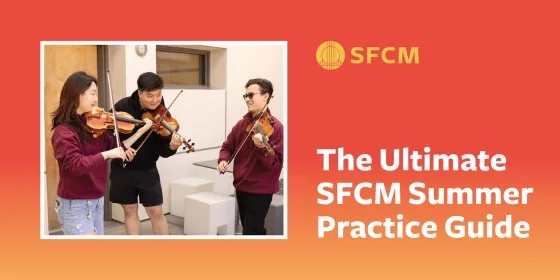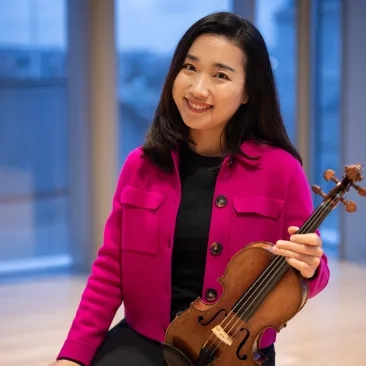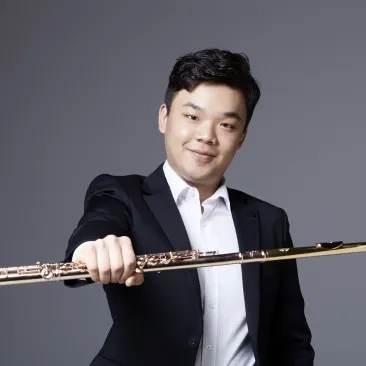Sound Advice! Practice Tips from SFCM All-Star Faculty
From rubato to rests, 12 all-star members of SFCM’s faculty give advice on how to approach summer as a young musician.
School’s out and summer’s in, but should your practice game take a rest? Or stay tuned?
Don’t fret: We asked SFCM’s seasoned faculty to drop their best summer practice tips—and they delivered. From trying fun new things, to polishing fundamentals, to just finding a good rhythm, faculty offer these ideas to save your skills from a summer slump.
Warren Deck, Tuba
“Take any time where you don’t have to perform at your highest level, and use it to ‘take the train off the tracks’ and work on the basic fundamentals of your instrument to cement good habits that will serve you well when the pressure to be at your best is in full force.”
Awadagin Pratt, Piano
“Really take advantage of the time without deadlines. Work on your capacity to be self-aware. Really listen to yourself. Be conscious of every movement being done with purpose. And read as much as you can about music and musicians.”
Jerome Simas, Clarinet
“I think it is essential to take a few days off (just not too many days!) after the intensity of the school year. Settle into your summer situation, whether it’s returning home and a summer job or to a summer music festival opportunity. Then look for music you love for its own sake that you didn’t have time to work on during the school year, and dig in! I also use the summer to reconnect with fundamentals and set goals for the next semester.”
Wonhee Bae, Violin
“Summer is a nice time to discover lots of new repertoire, which is hard to do during the busy school season. How about sight-reading some different music each week, even if it may not sound perfect? One doesn’t need any teacher in order to read music. By the time that you have a performing career, there will be a very limited time to learn any new music, and you will miss this summertime that you once spent!”
Scott Pingel, Double Bass
“Summer is a great time to work on your fundamentals, like rhythm. One way to practice this is to try practicing with the metronome on a different beat than you are used to. For example, if you are playing something in 3/4 time, but it is fast enough to be in 1, try practicing with the metronome clicking only on beat 3. This will make you responsible to count beats 1 and 2, and the metronome will ‘keep you honest’ on beat 3. You could also try putting it on beat 2. You can experiment with this in other time signatures as well. Basically, you want the metronome clicking on anything but the usual strong beats, such as beat 1.”
Catherine Cook, Voice
“The summer change in schedule is an opportunity to rest, reflect, and recharge. It’s a great time to listen, research, and plan new projects while maintaining your technique. Make practice goals that you can keep consistent while taking time to explore something new! Happy summer!”
Jason Hainsworth, RJAM, Saxophone
“One of my favorite practice tips that one of my teachers taught is, the faster you want to play something, the slower you need to practice it. Totally blew my mind!”
Jonathan Vinocour, Viola
“I think the summer is a great time to explore repertoire without the pressure of recital preparation, auditions, etc. Try digging into a challenging piece that might feel a bit beyond you and it may push you to improve in ways you don't expect. If it turns out to be a bit too much, no worries, because you're just exploring!”
Katherine Siochi, Harp
“During the summer months when you are likely taking fewer lessons, I would encourage you to cultivate the skill of being your own teacher. Use your ears to evaluate yourself meticulously; I like to record myself while practicing and then listen back to analyze my playing. When you focus purely on listening without having to play at the same time, you'll notice so many more details, whether relating to phrasing, tone quality, rhythm, tempo, dynamics, intonation, etc. Write down your observations and use this list as a set of practice points. When I struggle with technique in a particular passage, I also find it useful to record slow-motion video of myself, closely watching my finger, hand, and arm movements. This allows me to see where I am going wrong physically—excess tension being held somewhere in the body, or energy being misused by not keeping my movements concise and streamlined.”
Amelie-Anna Hinman, RJAM Percussion
“The best summer practice advice I got from a mentor was ‘don’t forget to just play and enjoy!’ Music is supposed to be fun!”
Yubeen Kim, Flute
“If you are not currently preparing for a competition or audition, I encourage you to take this time to reinforce your fundamentals. When you are not occupied with learning multiple pieces, it is an ideal moment to dedicate more focused practice to scales, articulation, finger technique, and the technical foundations that directly support your playing. In addition to practicing your primary instrument, I encourage you to listen broadly to music performed on other instruments. Expanding your listening in this way can offer fresh inspiration and deepen your understanding of sound and musical expression. Let this summer be a time of artistic curiosity and growth.”
Rhoslyn Jones, Voice
“Get outside. Go see beautiful things that inspire you. Spend time with people you care about. Read a book. Go to a museum. Go see an opera. Immerse yourself in art and rekindle the pure enjoyment of music. Take a good long break and have naps. Your voice and your future artistic self will thank you.”




